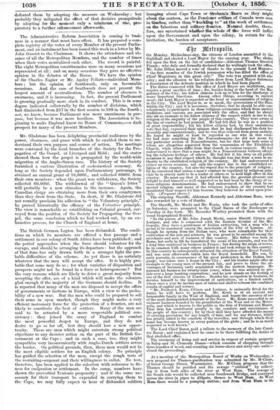The Administrative Reform Association is coming' to busi- ness in
a manner that must have effect. It has prepared a com- plete registry of the votes of every Member of the present Parlia- ment, and an instalment has been issued this week in a letter by Mr. John Gassiot to the Chairman. It shows the attendance and ab- sence of all the Metropolitan Members, and the number of times when their votes neutralized each other. The record is painful. The eight Metropolitan constituencies were on many occasions not represented at all ; and on many occasions they gave no effective opinion in the debates of the House. We have the opinion of Sir Charles Napier or Mr. Apsley Pellatt—individual Mem- bers ; bat the opinion of Southwark, only on favourable occasions. And the case of Southwark does not present the largest amount of neutralization. The number of absences is enormous, and it is increasing. In fact, the present Parliament is growing gradually more slack in its conduct. This is in some degree indicated collaterally by the number of divisions, which had diminished from 257 in the first session to 198 in the fourth ; not, we know, because Parliament was more unanimous in pur- pose, but because it was more heedless. The Association is be- ginning to make England know its House of Commons,—a dark prospect for many of the present Members.


































 Previous page
Previous page